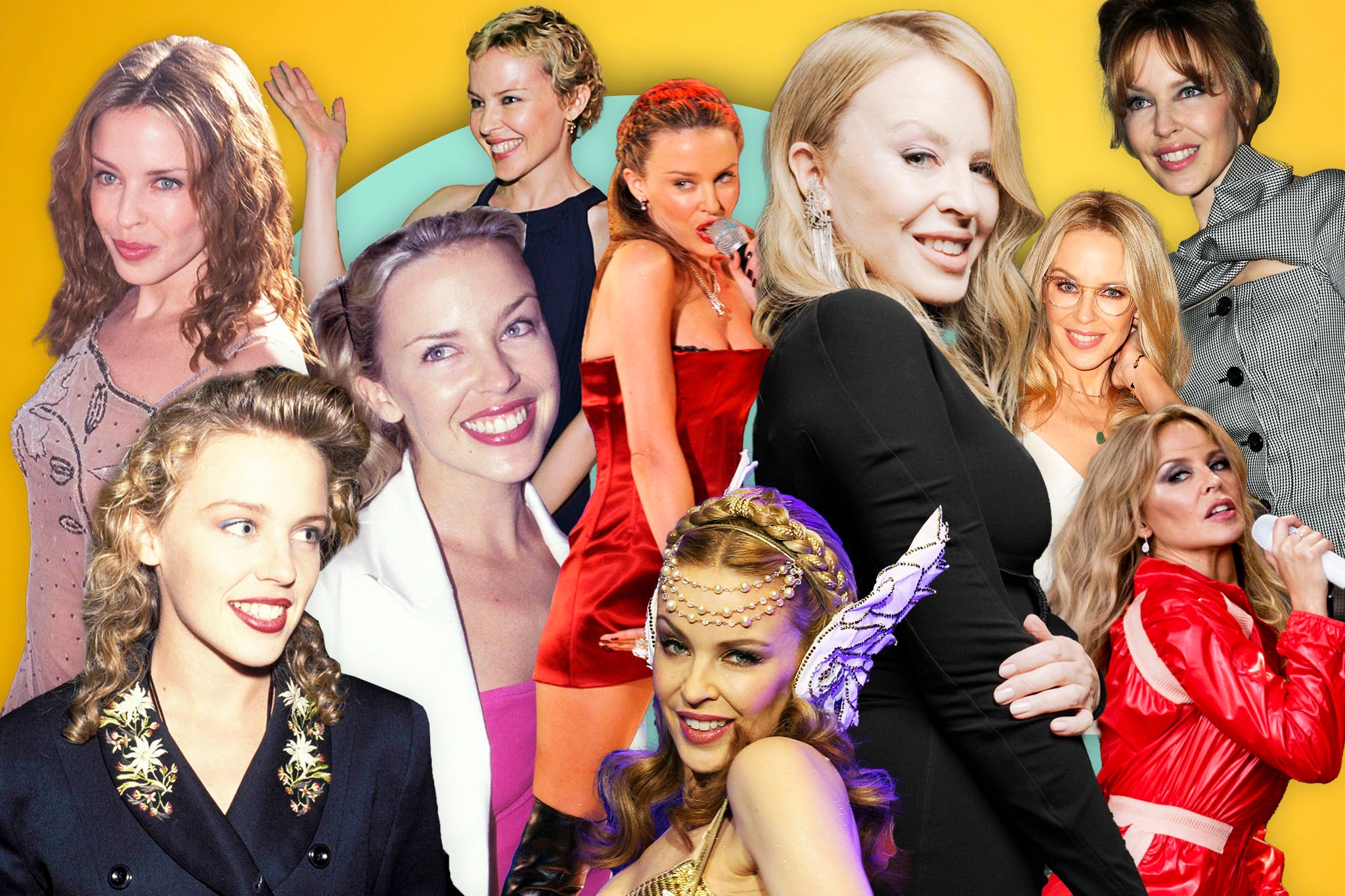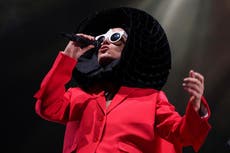Can’t get her out of my head: The enduring mystery of Kylie Minogue
As a child, Kate Solomon was turned towards crime by the ‘Padam Padam’ singer. Thirty years on, she asks, what do we really know about the elusive pop star?

When I was seven years old, I did one of the worst things I have ever done.
Diligently manning a stall at a Blue Peter bring-and-buy sale in my parents’ living room, which is the sort of thing my family did to pass the time in Wolverhampton in 1992, I noticed a framed photo of a blonde, bubble-permed woman grinning out from among the other tat. Under the picture was a name: Kylie Minogue. As our neighbours rifled through the jumble, my eye kept straying back to it: the slightly goofy front teeth, the perfectly proportioned features, the air of friendly approachability. I only really knew of Kylie because pop culture seeps into the pores of small children, but this photo completely beguiled me. I felt a psychic surety that this person was important to my life.
Around this time, I was developing a reputation as a bit of a do-gooder, swept up in the toddlerish glamour of Blue Peter appeals and Comic Relief. Once I convinced my school to let us raffle off the chance for a kid from each year to be the teacher for a day (and was furious when I did not win). No one can remember which appeal we were raising money for at our bring-and-buy sale, but whatever it was, it had moved us to action: it may have been for an orphanage in Romania; it may have been for children suffering from leprosy. Either way, it was important and worthy, and a lifetime of Sunday school and wholesome kids’ TV had instilled in me that it was my duty to help children whose lives were far worse than mine.
And yet. In the darkest moment of my desire to own the picture of Kylie, this random press shot of someone I was only vaguely aware of, I swished my empty hand in the cash box to make it sound like I had dropped 50p into it and announced to no one, “I’m buying this.” Kylie Minogue, the sweetest, most angelic pop star we have ever known, had an ineffable and infinite power, one that had undone the influence of every parable that had ever been drilled into me. Kylie Minogue had incited me to steal – and from dying kids.
By this time in the early 1990s, Kylie was entering a transformative phase herself. The photo that seemed so precious to me depicted someone who didn’t really exist any more. Kylie probably wasn’t out nicking stuff from charity shops, but she was beginning to tire of the vapid pop hits that she had been the mouthpiece for ever since she arrived at Stock Aitken Waterman’s studio in 1987. The Eighties hit-writers had forgotten she was coming, and legend has it that they bashed out “I Should Be So Lucky” for the 19-year-old Neighbours star in 40 minutes while she waited outside.
By 1991, she had released four albums on PWL, Pete Waterman’s record label, each following pop blueprints of the time: hi-NRG beats, liberal use of balladry, and no more than one or two writing credits from the artist herself. “In the five years with them,” she told Jessie Ware on her Table Manners podcast in 2020, she had gone “from a 19-year-old to early twenties, becoming furious, wanting to become more involved, be in the room – not be in the waiting room until they were ready”.
She signed with an indie label in 1993 and embarked on some of her most interesting and personal work. Her self-titled album features Confide in Me, a sultry trip-hoppy snake-charmer of a song. She became friends with Nick Cave (who had “had a quiet obsession with her for about six years” – Cave and seven-year-old me may have got on quite well), and collaborated with him on the 1995 murder ballad “Where the Wild Roses Grow”. She ditched fellow teen heartthrob Jason Donovan and dated hedonistic INXS frontman Michael Hutchence, to the delight of tabloid hacks everywhere. The album Impossible Princess dipped into a range of “cool” genres and involved “real musicians” like the Manic Street Preachers, leading the NME to brand Kylie “a total fraud” for daring to step outside the pop mainstream. Eye roll.

Up until that point, Kylie had been Olivia Newton-John at the start of Grease. Now she was Olivia Newton-John at the end, slinky catsuit and all. In the 30 years since, the stylistic revamps have not stopped coming: indie Kylie gave way to sex-kitten Kylie, to gold hotpants Kylie, to country Kylie, to disco Kylie, to today’s freewheeling Padam Kylie. She is beloved, almost universally: everyone from Bono to the prime minister of Ireland goes gooey at the very idea of her.
“I don’t know why it is that rock bands like Kylie,” Bono said in 2006. “But it is true that we do, and in a way that we don’t quite understand.” And behind it all is a woman who has remained as fascinatingly anonymous, as psychologically out of reach as she was in the photo that knocked about in my bedroom for several years. “Get to know me close,” she purrs on this year’s smash “Padam Padam”, but good luck with that. Who IS Kylie Minogue? What is this strange power she possesses?
Perhaps part of her power comes from this unknowableness, the suggestion that still waters run deep but no swimming is allowed
Throughout her nearly 40 years of fame, she has built pleasantly painted but iron-clad walls around herself. We know the broad strokes of Kylie, of course. She’s nice! She’s friendly! She’d probably water your plants for you while you were on holiday. She is cheeky, likes to laugh, and has a healthy sense of irony about her early pop years (see: the 1996 Poetry Olympics, where she gave an impromptu dramatic reading of “words I did not write” – the lyrics to “I Should Be So Lucky”. It “felt like I was meeting the girl I had been trying to get away from”, she later said).
Constant reinvention, glistening songs, bottles of branded rosé and super-nice conversations charm and obfuscate. She has become a master of open-hearted concealment: “I am here to service Padam,” she told the hosts of the American talk show Today 3rd Hour recently. Her recent Rolling Stone UK cover story revealed the fascinating truths that she likes to binge-watch TV and go on holiday.
Perhaps part of her power comes from this unknowableness, the suggestion that still waters run deep but no swimming is allowed. After going through treatment for breast cancer in 2005, she resumed the curtailed Showgirl tour in 2006, and reluctantly agreed to her creative director and close friend William Baxter filming documentary footage. For every scene of her goofing around and flirting with the camera, there is another where she tries to bat it away, to get out of wearing her radio mic, to deflect, redirect, pull focus from her words. “I know what I want to get out of you,” Baxter says to her over the kitchen table. “But I don’t know what I’m prepared to give,” she replies, raising an eyebrow.

But you do catch a glimpse. Kylie hugs with her whole heart, wrapping her entire arms around the necks of her dancers and holding them for a moment longer than seems natural. She clearly relishes attention when she’s dancing around her dressing room or suggesting that a fun thing to do during her downtime would be a photoshoot, but she generally seems happy to sit back and let others talk. It seems telling that the reason she loves Paris is because you have to become a slightly different person to exist among the haute couture and macarons. In serious conversation, she considers her words slowly and carefully: smart but guarded.
We feel entitled to know celebrities intimately, when of course we have no such right. We call this a parasocial relationship, now that we have the language to do so. Fans have been nurturing these feelings towards pop stars for decades, and the perception of proximity that social media (and reality TV) often gives us has fuelled the impression that we are as constant in their lives as they are in ours.
Kylie is not the only person keeping her private thoughts private: I am sure Dua Lipa lives a fascinating life, but you wouldn’t know it from her interviews, which tend to be bland, painted in broad strokes, and empty of emotional detail, despite her healthy curiosity about the world (as evidenced by her podcast, Service 95, and its accompanying newsletter). I refuse to believe she is dull, married only to her work, but she does not give us a sense of herself beyond that. Perhaps musicians, more than any other celebrities, feel like public property, as they mine their personal lives to communicate small, specific emotions that resonate within us, that become part of the fabric of our lives.
Kylie – like Dua, like all pop stars, like all celebrities, and like all the people you will ever meet in the world – does not owe us anything of herself. Now, at 55 and achieving yet another career high, she points, continually, to the songs as vessels for these out-of-reach parts of her, and that is where she is often hiding in plain sight. But I hope that Kylie Minogue is aware of her powers, which stretch far beyond her songs: if she can incite me to theft, and Bono to admit liking pop music, who knows what else she can do?
Join our commenting forum
Join thought-provoking conversations, follow other Independent readers and see their replies
Comments


Bookmark popover
Removed from bookmarks